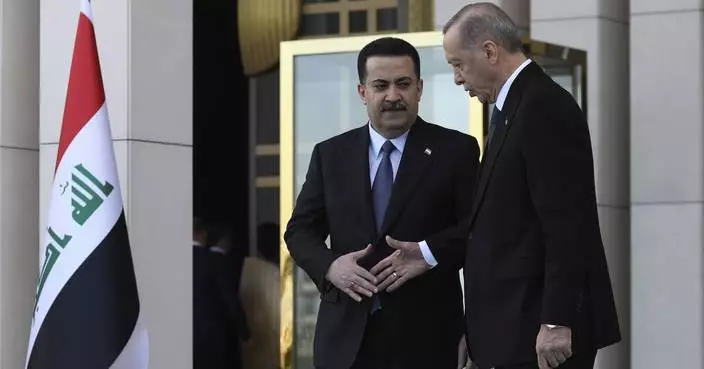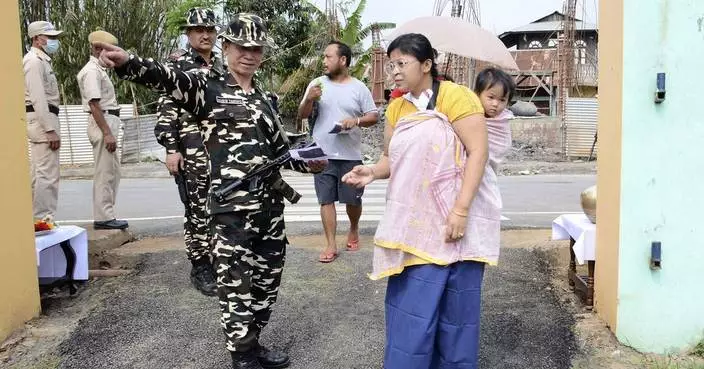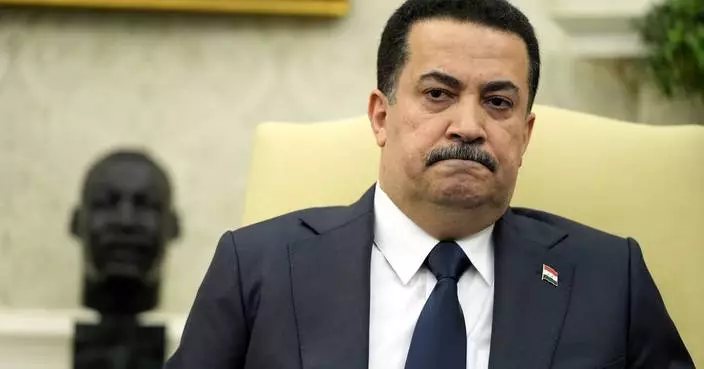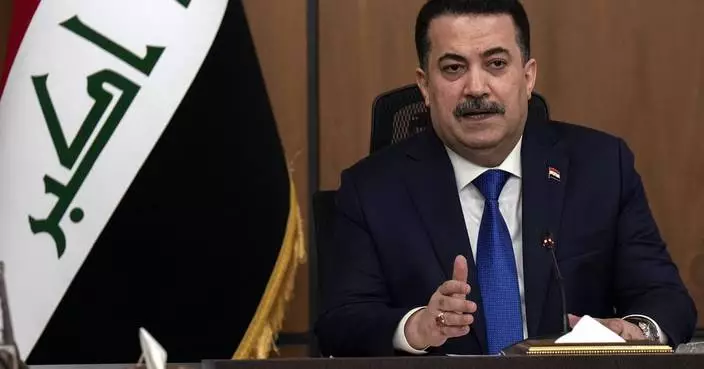Human rights monitors sounded the alarm over a recent spike in assassinations targeting civil rights activists in Iraq's south on Thursday, ahead of a much anticipated meeting between the prime minister and the U.S. president as part of ongoing strategic talks.
Mustafa al-Kadhimi departed for an official trip to Washington this week and is expected to meet with President Donald Trump on Thursday to conclude strategic talks expected to shape the future of Iraq-U.S. ties.
Back home, rockets have continued to target the seat of his government, while assassination plots have targeted more civil activists this month in southern Iraq, compared to the period at the height of the protest movement in October, monitors said. Iran-backed militia groups are widely suspected of perpetrating both.
Tens of thousands of Iraqis took to the streets in October to decry rampant government corruption, poor services and unemployment in Baghdad and across Iraq’s south. Hundreds died as Iraqi forces used live ammunition and tear gas to disperse crowds.
Activist Reham Yacoub was gunned down in the southern Iraqi province of Basra on Wednesday by unidentified gunmen, a security official and human rights watcher said, marking the second such killing in the span of a week. The official spoke on condition of anonymity in line with regulations.
Activist Tahseen Osama was killed Friday, prompting dozens to take to the streets and block roads. Police responded by firing live rounds at the demonstrators.
Yacoub was a respected activist who took part in many protests in 2018 and October.
“It seems that there is a well programmed cleansing of activists who were influential in the last protest movement,” said Ali al-Bayati, spokesman for the semi-official Iraqi Independent High Commission for Human Rights.
Al-Bayati said the government was also complicit in the killings because of its “silence” and “inability to take real action to stop it.”
According to the commission, there have been six assassination attempts targeting activists with two killed in Basra in the month of August alone. That represents a jump as the commission recorded 16 attempted targeted killings in the 10 months after the uprising started in October.
A recent government investigation said 560 protesters and security forces were killed in the October movement. The probe drew criticism from activists who said it fell short of naming the perpetrators, who are widely suspected of having links to Iran-backed militia groups.
Al-Kadhimi fired the Basra police chief on Monday and ordered a new probe into the killing of Osama.
In Washington, talks are expected to focus on the future of the U.S.-led coalition in Iraq. Coalition troops have left most bases in a planned drawdown. U.S. officials have also voiced concern over the presence of Iran-backed militia groups.
Following a meeting in Washington with Iraqi Foreign Minister Fuad Hussein on Wednesday, Secretary of State Mike Pompeo told reporters that armed groups outside of state control “have impeded our progress."
Key energy deals were also signed between Iraq and U.S. companies on the sidelines of the meeting, including with General Electric, Honeywell and Stellar Energy, according to a State Department statement. after Baghdad detailed recent efforts to increase domestic gas supply to reduce reliance on Iran.
ALEXANDRIA, Va. (AP) — A lawyer for the military contractor being sued by three survivors of the notorious Abu Ghraib prison in Iraq told jurors Monday that the plaintiffs are suing the wrong people.
“If you believe they were abused ... tell them to make their claim against the U.S. government,” said John O'Connor, defense attorney for Reston, Virginia-based military contractor CACI, during closing arguments at the civil trial in federal court. “Why didn't they sue the people who actively abused them?”
The lawsuit brought by the three former Abu Ghraib detainees marks the first time a U.S. jury has weighed claims of abuse at the prison, which was the site of a worldwide scandal 20 years ago when photos became public showing U.S. soldiers smiling as they inflicted abusive and humiliating treatment on detainees in the months after the U.S. invasion and occupation of Iraq.
The suit alleges that civilian interrogators supplied by CACI to Abu Ghraib contributed to the torture the plaintiffs by conspiring with military police to “soften up” detainees for interrogations.
CACI, in its closing arguments, relied in part on a legal theory known as the “borrowed servant doctrine,” which states an employer can't be liable for its employees' conduct if another entity is controlling and directing those employees' work.
In this case, CACI says the Army was directing and controlling its employees in their work as interrogators.
Lawyers for the plaintiffs disputed that CACI relinquished control of its interrogators to the Army. At trial, they introduced evidence that CACI's contract with the Army required CACI to supervise its own employees. Jurors also saw a section of the Army Field Manual that pertains to contractors and states that "only contractors may supervise and give direction to their employees.
Muhammad Faridi, one of the plaintiffs' lawyers, told jurors that the case is simpler than CACI's lawyers are trying to make it.
He said that if CACI interrogators conspired with military police to inflict abuse on detainees to soften them up for interrogations, then the jury can find CACI liable even if CACI interrogators never themselves inflicted abuse on any of the three plaintiffs.
All three plaintiffs testified to horrible treatment including beatings, sexual assaults, being threatened with dogs and forced to wear women's underwear, but said the abuse was either inflicted by soldiers, or by civilians who couldn't be identified as CACI workers. In some cases, the detainees said they couldn't see who was abusing them because they had bags over their heads.
As evidence of CACI's complicity, jurors heard testimony from two retired generals who investigated the Abu Ghraib scandal in 2004; both concluded that CACI interrogators engaged in misconduct.
Faridi told the jury that while many of the soldiers who abused detainees were convicted and sentenced to prison, CACI has not yet been held accountable.
“When our country's military found out about the abuse, they didn't cover it up,” Faridi said. “Our country's military held the military police members who were perpetrating the abuse accountable. CACI escaped liability.”
And Faridi said that even when the Army asked CACI to hold its its interrogators responsible, it still sought to evade responsibility. In May 2004, the Army asked CACI to fire one of its interrogators, Dan Johnson, after one of the Abu Ghraib photos showed Johnson interrogating a detainee who was forced into an awkward crouching position that investigators concluded was an illegal stress position.
CACI contested Johnson's dismissal, writing that the “photo depicts what appears to be a relatively relaxed scene” and saying that “squatting is common and unremarkable among Iraqis.”
“I'll leave that to you to consider whether you find that offensive,” Faridi told the jury Monday.
At trial, CACI employees testified they defended Johnson's work because Army personnel had asked them through back channels to do so. O'Connor said that out of the many hundreds of photos of abuse at Abu Ghraib, the photo of Johnson is the only one depicting a CACI employee, and it shows him questioning not one of the plaintiffs but an Iraqi policeman after someone had smuggled a gun into the prison and shot at military police.
O'Connor also apologized for parts of his case that were “long, annoying and boring” but said he had no choice because the U.S. government claimed that some evidence, including the identities of interrogators, was classified. So jurors, rather than hearing live testimony, were subjected to long audio recordings in which the interrogators' voices were doctored and their answers were often interrupted by government lawyers who instructed them to not answer the question.
The trial was delayed by more than 15 years of legal wrangling and questions over whether CACI could be sued. Some of the debate focused on the question of immunity — there had long been an assumption that the U.S. government would hold sovereign immunity from a civil suit, and CACI argued that, as a government contractor, it would enjoy derivative immunity.
But U.S. District Judge Leonie Brinkema, in a first-of-its-kind ruling, determined that the U.S. government cannot claim immunity in cases involving fundamental violations of international norms, such as torture allegations. And, as a result, CACI could not claim any kind of derivative immunity, either.
The eight-person jury deliberated about three hours before pausing Monday afternoon without reaching a verdict. Deliberations are set to resume Wednesday.
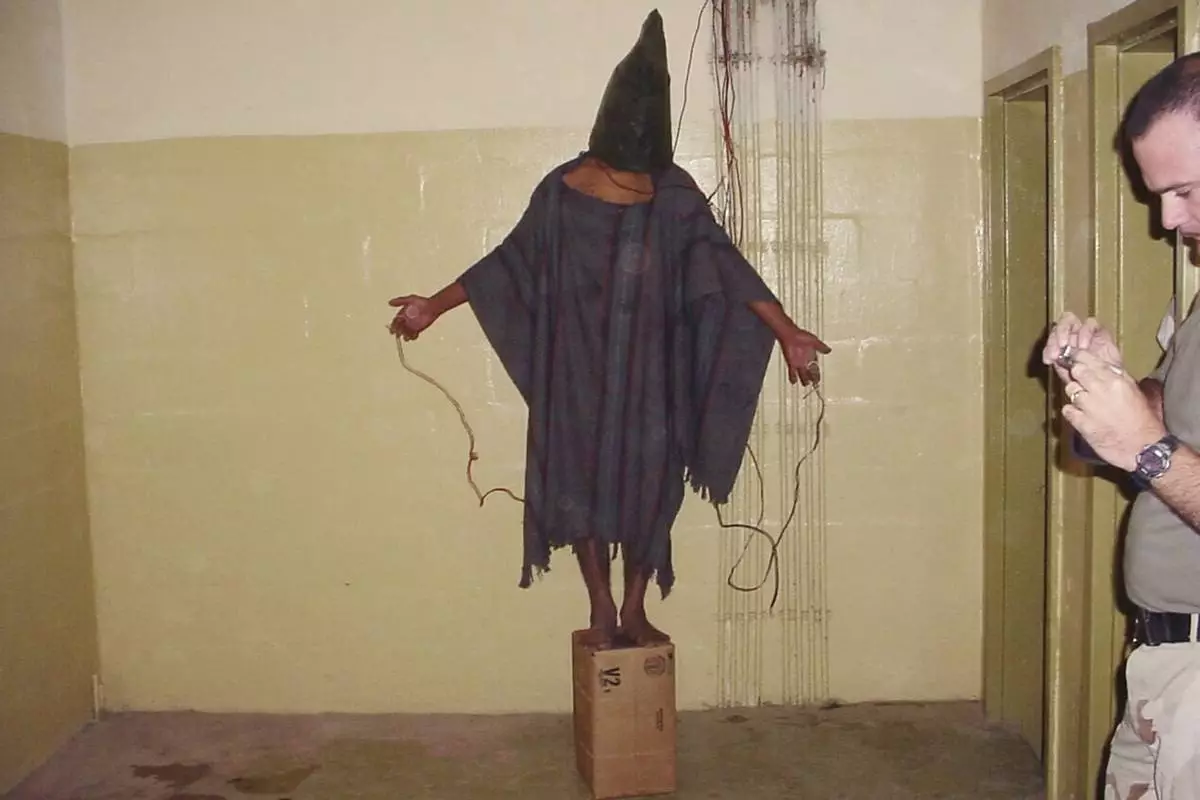
FILE - This late 2003 photo obtained by The Associated Press shows an unidentified detainee standing on a box with a bag on his head and wires attached to him in the Abu Ghraib prison in Baghdad, Iraq. A trial scheduled to begin Monday, April 15, 2024, in U.S. District Court in Alexandria, Va., will be the first time that survivors of Iraq’s Abu Ghraib prison will bring their claims of torture to a U.S. jury. Twenty years earlier, photos of abused prisoners and smiling U.S. soldiers guarding them shocked the world. (AP Photo, File)
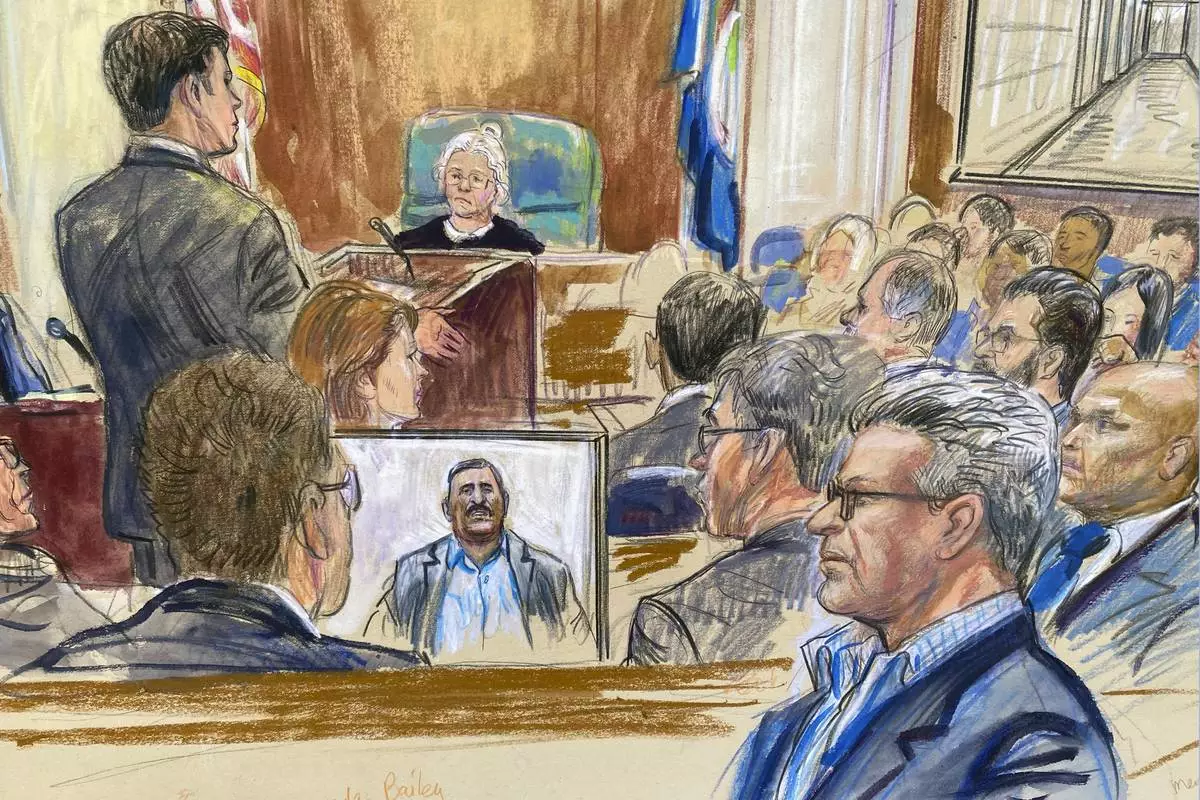
This artist sketch depicts Salah Al-Ejaili, foreground right with glasses, a former Al-Jazeera journalist, before the U.S. District Court in Alexandria, Va., Tuesday, April 16, 2024. Al-Ejaili, a former detainee at the infamous Abu Ghraib prison, has described to jurors the type of abuse that is reminiscent of the scandal that erupted there 20 years ago: beatings, being stripped naked and threatened with dogs, stress positions meant to induce exhaustion and pain. (Dana Verkouteren via AP)
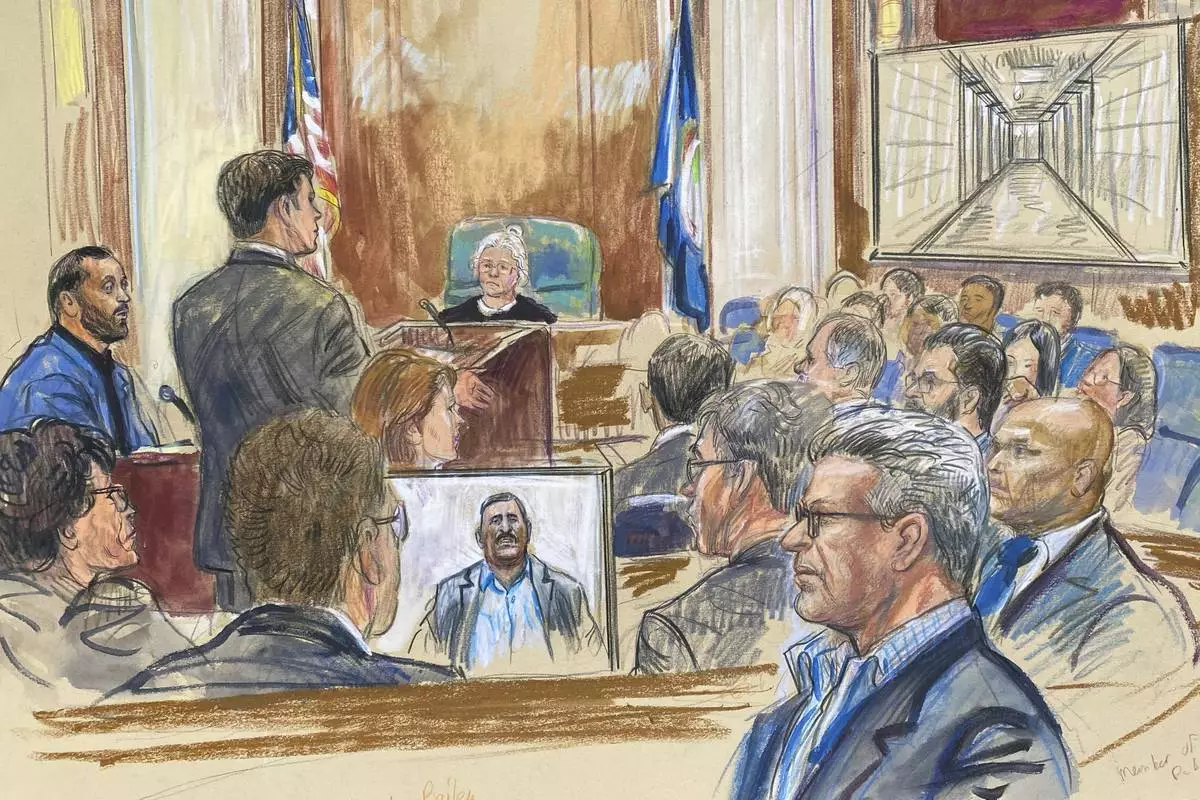
This artist sketch depicts Salah Al-Ejaili, foreground with glasses, a former Al-Jazeera journalist, before the U.S. District Court in Alexandria, Va., Tuesday, April 16, 2024. Al-Ejaili, a former detainee at the infamous Abu Ghraib prison, has described to jurors the type of abuse that is reminiscent of the scandal that erupted there 20 years ago: beatings, being stripped naked and threatened with dogs, stress positions meant to induce exhaustion and pain. (Dana Verkouteren via AP)
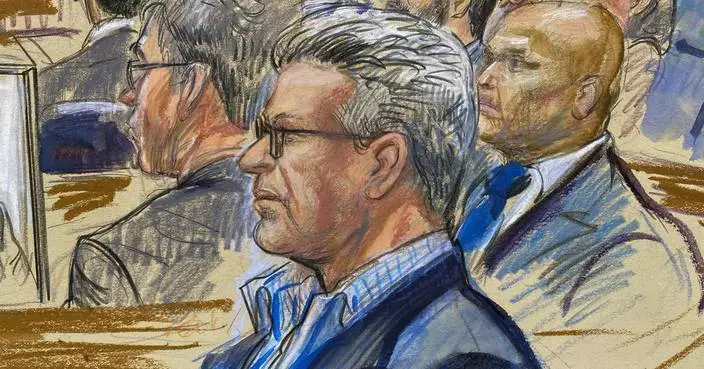
Jury deliberating in Iraq Abu Ghraib prison abuse civil case; contractor casts blame on Army
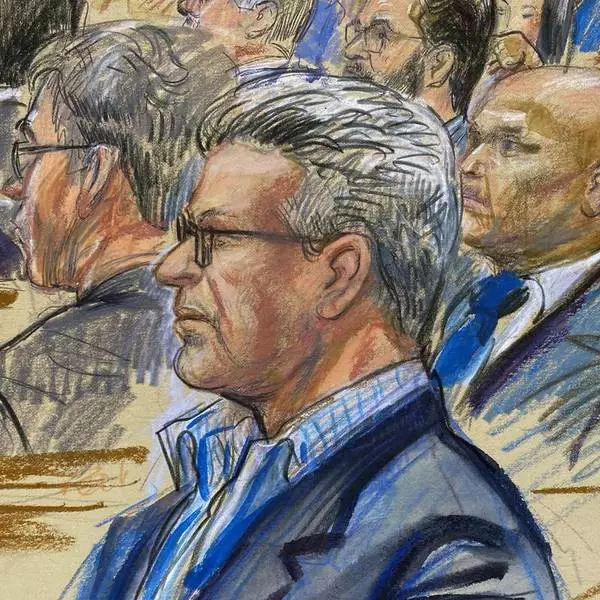
Jury deliberating in Iraq Abu Ghraib prison abuse civil case; contractor casts blame on Army
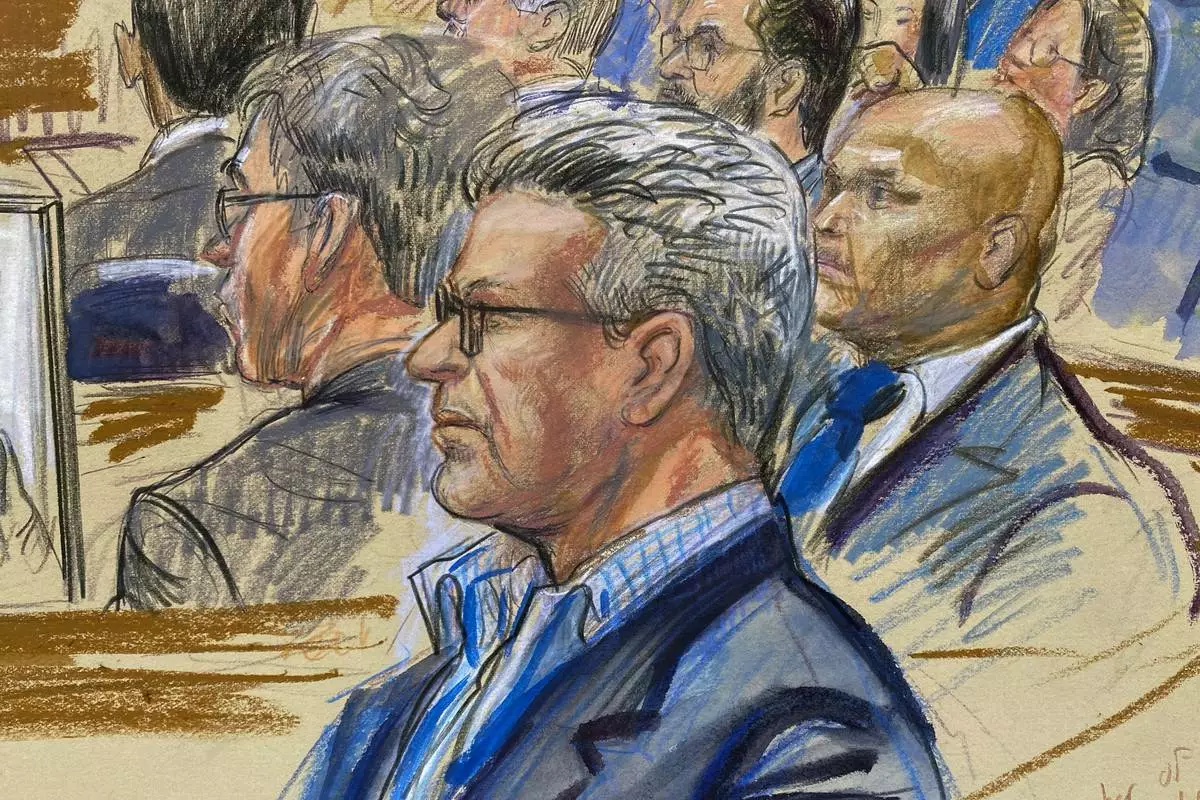
This artist sketch depicts Salah Al-Ejaili, foreground with glasses, a former Al-Jazeera journalist, before the U.S. District Court in Alexandria, Va., Tuesday, April 16, 2024. Al-Ejaili, a former detainee at the infamous Abu Ghraib prison, has described to jurors the type of abuse that is reminiscent of the scandal that erupted there 20 years ago: beatings, being stripped naked and threatened with dogs, stress positions meant to induce exhaustion and pain. (Dana Verkouteren via AP)










